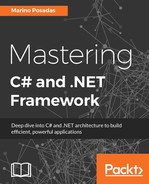In this chapter, we saw some of the most relevant enhancements made to the C# language in versions 2 and 3.
We started by reviewing the main differences between C# and other languages and understanding the meaning of strongly typed, in this case, together with the concepts of static and dynamic.
Then, we explained some of the main reasons behind the creation of the concept of delegates—absolutely crucial in .NET—and whose origins were motivated by very serious and solid architectural reasons. We also revised .NET usage in several common programming scenarios.
We followed this up with an examination of the generics feature that appeared in version 2.0 of the framework and analyzed some samples to illustrate some typical use cases, including the creation of custom generic methods.
From generics, we moved on to Lambda expressions, which appeared in the version that follows, allowing us to simplify calls to generic methods by passing anonymous methods expressed in a very elegant syntax.
Finally, we covered the LINQ syntax, which permits the implementation of complex queries to a collection in a way that strongly reminds you about the SQL syntax you surely know and use.
We ended with a simple extension method to check how we can use the existing functionality in order to extend its default methods in a way that suits our programming requirements without affecting the original definitions.
In the next chapter, we'll look at news and enhancements that appeared in the recent versions of the framework (4, 4.5, and 4.6), which include dynamic definitions, improved logical expressions, new operators, and so on.
